#Argungu fishing festival
Explore tagged Tumblr posts
Text
FISHING FESTIVAL IN AFRICA
Argungu Fishing Festival
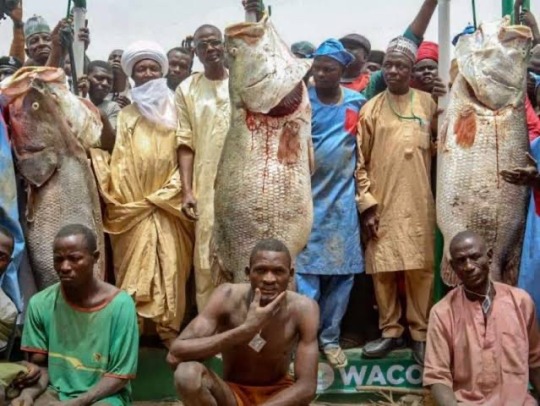
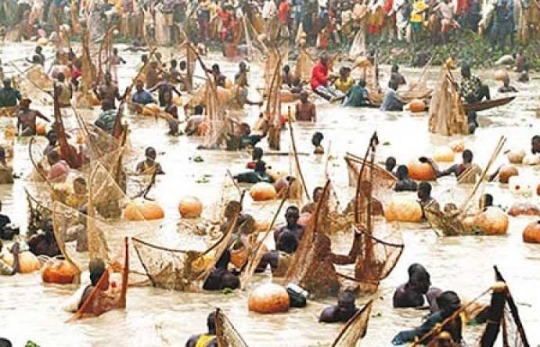
There are lovely cultures and traditions in Africa
Black Americans should read about their heritage
Welcome to Argungu Fishing Festival
Argungu fishing festival is a way of life for the people of Kebbi State. The festival preserves tradition and promotes conservation. The annual festival takes place in February and marks the end of farming season and start of the fishing season. The festival is a four-day cultural event. It begins with an agricultural show, water sport displays, traditional Kebbawa entertainments and ends with the spectacular fishing competition in the Mata Fadan River.
The History
The Argungu fishing festival began in 1934, marking the end of centuries old hostility between Sokoto Caliphate and Kebbi Kingdom. The festival quickly became a celebration of life and unity.

The River Sacrifice
Before the commencement of the fishing festival, the custodian of the river 'Sarkin Ruwa' ensures the river is safe by performing sacrifices to the river oracle to gain its permission.

Sarkin Ruwa
Like his fathers before him, the Sarkin Ruwa is the official custodian of the Mata Fada River. This responsibility is passed down for generation. Without the consent of the Sarkin Ruwa, no fish can be caught. To ensure the river is safe for fishing, he dispels the crocodiles resident in the river and invites all the fishes in the rivers connected to Mata Fada river.
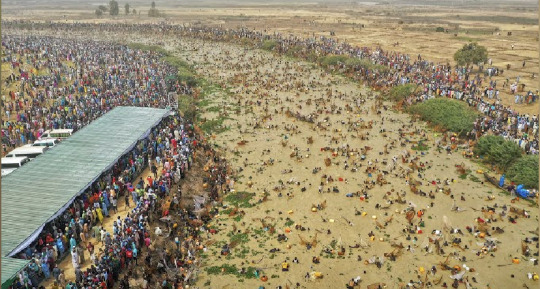
Matan Fada River
The river is a source of pride to the people of Argungu, it serves as a source of food and irrigation for their farm lands. Its about 50 meters wide and about 50 feet deep.
Race To Fish
At the sound of a gun, thousands of fishermen race towards the mata fadan river, leaping into the water to begin their search for the winning freshwater fish
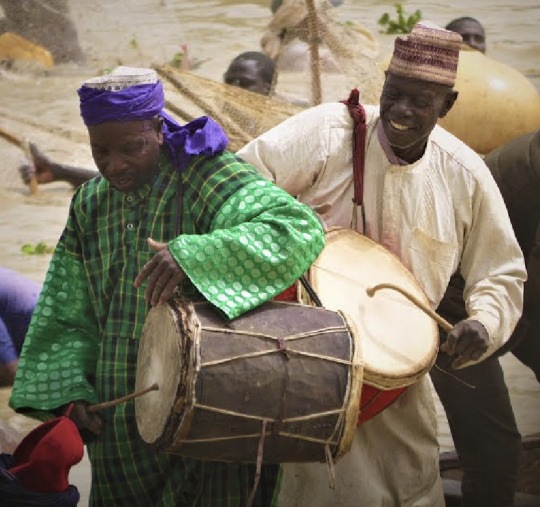
Music and Rhythm
As the fishermen leap into the water, the drummers begin to beat their drums. Filling the air with authentic Kebbawa traditional rhythm. Although women are not allowed to participate in the fishing competition, they are not left out of the drummers group. The drums are traditional Kebbawa drum designs, made of cow skin.
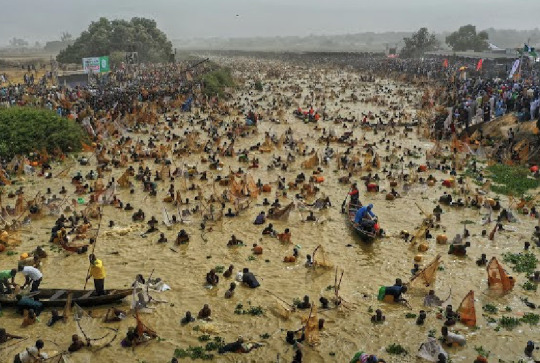
Over 50,000 fishermen from northern Nigeria and surrounding countries participate in the fishing competition annually.
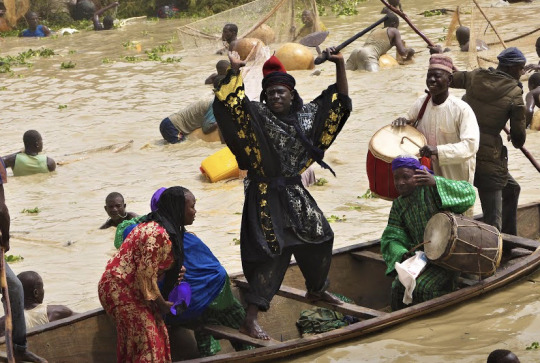
The Sarkin Ruwa and the drummers move to and fro the mata fada river on their canoes, entertaining the fishermen as they search the river for the winning Giwan Ruwa.
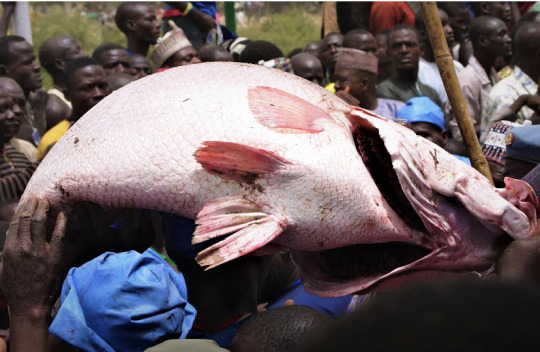
Giwan Ruwa
Giwan Ruwa 'Fish' from the mata fadan river can weigh up to 75 kilograms. The fisherman with the biggest catch wins the fishing competition.
#life#animals#culture#aesthetic#black history#history#blm blacklivesmatter#anime and manga#architecture#black community#traditional illustration#traditional doodle#blacklivesmatter#black heritage
281 notes
·
View notes
Text
Celebrate Nigeria: Unveiling Vibrant Cultural Festivals across the Nation

# Celebrate Nigeria: Unveiling Vibrant Cultural Festivals across the Nation
Introduction
Nigeria, a country known for its rich cultural heritage and diverse traditions, is home to a myriad of colorful and vibrant festivals that showcase the beauty and diversity of its people. Have you ever wondered about the cultural tapestry that weaves through Nigeria's festivals, uniting various ethnic groups in celebration? In this blog post, we will delve into the heart of Nigeria's Cultural Festivals, exploring the significance, traditions, and sheer exuberance that define these events.
The Diversity of Nigeria Cultural Festivals
Nigeria's cultural festivals are a vibrant tapestry that reflects the country's diverse ethnic groups, traditions, and history. From the bustling streets of Lagos to the serene landscapes of Calabar, each region of Nigeria boasts its own unique celebrations that captivate both locals and tourists alike. Let's embark on a journey through some of Nigeria's most renowned cultural festivals:Osun-Osogbo FestivalThe Osun-Osogbo Festival, held annually in Osun State, is a celebration dedicated to the river goddess Osun. This festival attracts thousands of worshippers and tourists from far and wide to partake in the colorful processions, dances, and rituals that honor Osun, the deity of fertility and purification.- The festival includes the Arugba procession, where a chosen maiden carries offerings to the river, symbolizing the renewal of life and prosperity. - Visitors can witness traditional performances of drumming, dancing, and masquerades that fill the air with a pulsating rhythm. - Practical Tip: To fully experience the Osun-Osogbo Festival, arrive early to witness the rituals at the sacred grove and immerse yourself in the spiritual ambiance. - The festival features elaborate horse-riding displays, traditional music performances, and vibrant exhibitions of local crafts and textiles. - Visitors can marvel at the skillful horsemanship of riders who execute intricate maneuvers and formations with grace and precision. - Actionable Advice: For a prime viewing spot at the Durbar Festival, position yourself along the parade route early to witness the procession in all its splendor. - The Eyo Masquerades, adorned in vibrant regalia, move through the city streets in a procession accompanied by drummers, dancers, and spectators. - This festival embodies the spirit of camaraderie and unity as participants from different socio-cultural backgrounds come together to celebrate shared heritage. - Expert Insight: The Eyo Festival offers a unique opportunity to witness Lagos' cultural heritage and traditional artistry firsthand, making it a must-see event for visitors. - The highlight of the festival is the fishing competition, where fishermen armed only with traditional nets dive into the river in a race to catch the biggest fish. - Spectators can enjoy traditional music, dance performances, and cultural displays that reflect the vibrant heritage of the region. - Best Practice: To fully appreciate the excitement of the Argungu Fishing Festival, engage with locals, participate in cultural activities, and savor traditional delicacies offered during the event. - The festival features offerings of newly harvested yams to deities and ancestors, accompanied by prayers and blessings for a bountiful harvest. - Communities come together to showcase traditional dances, music, and masquerades that embody the cultural identity and heritage of the region. - Real-World Example: The Iriji-Mmanwu Festival in the Igbo community is a vibrant celebration of the New Yam Festival, where masquerades known as Mmanwu perform acrobatic feats and entertain spectators during the festivities. - The festival features art installations, fashion shows, live music performances, and culinary experiences that highlight the richness and vibrancy of African culture. - Visitors can engage with local artists, designers, and performers to gain insight into the creative process and cultural significance of their work. - Practical Tip: To make the most of your experience at the Lekki African Culture Festival, attend workshops and interact with artisans to learn about traditional crafts and techniques firsthand.
Conclusion
In conclusion, Nigeria's Cultural Festivals offer a captivating glimpse into the country's heritage and traditions, showcasing the diversity and vibrancy of its people. As we've explored the Osun-Osogbo Festival's spiritual reverence, the Durbar Festival's equestrian spectacle, and the New Yam Festival's agricultural roots, it becomes evident that these celebrations are more than just events—they are a testament to the resilience and creativity of Nigerian culture.By immersing ourselves in the sights, sounds, and flavors of festivals like the Argungu Fishing Festival and the Eyo Festival, we gain a deeper appreciation for the interconnectedness of Nigeria's various ethnic groups and the enduring spirit of unity that underpins these celebrations. As we celebrate Nigeria through its Cultural Festivals, let us embrace the shared values of community, heritage, and joy that bind us together in a tapestry of cultural richness.Join the conversation: Which Nigeria Cultural Festival resonates with you the most? Share your thoughts and experiences in the comments below!
Frequently Asked Questions
Q: Are Nigeria Cultural Festivals only for locals, or can tourists participate? A: Nigeria Cultural Festivals welcome both locals and tourists to partake in the celebrations and experience the rich tapestry of Nigerian culture firsthand. Q: How can I prepare for attending a Nigeria Cultural Festival? A: To prepare for attending a Nigeria Cultural Festival, research the festival's traditions and customs, dress modestly and respectfully, and be open to immersing yourself in the cultural experience.Q: Can I participate in the rituals and ceremonies of Nigeria Cultural Festivals? A: While some Nigeria Cultural Festivals allow for spectator participation, it is essential to respect the sacredness and significance of rituals and ceremonies by observing from a respectful distance unless invited to participate.Q: Are Nigeria Cultural Festivals safe for visitors to attend? A: Nigeria Cultural Festivals prioritize safety and security for all participants and visitors. It is advisable to follow local guidelines, seek information from official sources, and exercise caution when attending large gatherings.Q: How can I learn more about Nigeria Cultural Festivals throughout the year? A: To stay informed about Nigeria Cultural Festivals taking place throughout the year, follow official tourism websites, local event calendars, and cultural organizations that promote traditional celebrations.Q: Are there opportunities for cultural exchange and engagement at Nigeria Cultural Festivals? A: Nigeria Cultural Festivals provide ample opportunities for cultural exchange and engagement, allowing visitors to interact with locals, artisans, and performers to learn about traditional practices, crafts, and customs.Q: How can I support the preservation and promotion of Nigeria Cultural Festivals? A: To support the preservation and promotion of Nigeria Cultural Festivals, consider attending festivals, purchasing crafts and artworks from local artisans, and sharing your experiences with others to raise awareness about the cultural heritage of Nigeria.
Tags
Nigeria Cultural Festivals, Osun-Osogbo Festival, Durbar Festival, Eyo Festival, Argungu Fishing Festival, New Yam Festival, Lekki African Culture Festival, Nigerian traditions, cultural heritage. Read the full article
0 notes
Text
By • Olalekan Fagbade NIMASA DG reveals aspect of the economy that can generate 350 million jobs for Nigerian youths Abuja, Oct. 6, 2023 (NAN) Dr Bashir Jamoh, Director-General, Nigerian Maritime Administration and Safety Agency (NIMASA), says the blue economy will offer 350 million jobs to Nigerian citizens if adequately harnessed. Jamoh, who was represented by the Acting Coordinator of NIMASA, Abuja Office, Hajia Rakiya Lamai, made this known during the NIMASA Special Day at the 18th Abuja International Trade Fair, Abuja. According to him, Nigeria’s vast under-utilised blue economy offers huge opportunities for growth and development to overcome its present economic challenge. “The blue economy has enormous potential as it offers the country the opportunities of 350 million new jobs if adequately harnessed. “Ocean resources like fishes, shrimps and other sea foods have not been satisfactorily harnessed, just as ship repairs are done in neighboring countries and in faraway Turkey because the facilities are lacking locally. “With a combination of modern technology, relevant laws and support from the Federal Government, relevant agencies and stakeholders, disbursement of CVFF Funds, NIMASA is working to fulfill its mandate of regulating operations in the maritime industry,” he said. He said NIMASA was intensifying efforts to secure the Nigerian maritime environment and develop indigenous capacity for shipping expansion to provide value addition for sustainable growth and development of the Nigerian economy. Jamoh further said waterways expansion would be a much better incentive than tax waivers as it would encourage more Foreign Direct Investment (FDI) and private sector involvement in the maritime transport business. According to the NIMASA boss, moving toward waterways expansion will boost Port services and encourage the much-needed development in the industry. “While we await a cohesive policy to fully kick into gear, we must all become ‘Blue Ambassadors’ (Advocates for the Blue Economy). “The Blue Economy is every Nigerian’s Economy; the Media, Civil Society and other non-state actors, all have a role to play in galvanizing greater national awareness and participation. “We must rethink our waters, we need a total rethink from a ceremonial view; events such as Argungu Fishing Festival as well as others which must be redesigned and repackaged from the standpoint of the blue economy,” he said. He said efforts ought to be doubled to banish sea blindness amongst Nigerians and make seaward and sea-related activities more mainstream and attractive. He added that a Public Private Partnership (PPP) ought to be harnessed for maritime cluster development. (NAN) #NIMASADGrevealsaspectoftheeconomythatcangenerate350millionjobsforNigerianyouths
0 notes
Photo

Argungu Fishing Festival, Ablade Glover, 1993
Oil on canvas 105 x 157 cm (41 ½ x 61 ¾ in.)
#art#painting#ablade glover#contemporary art#african art#black artists#20th century#1990s#oil#ghanaian#nigeria#argungu#100 notes
122 notes
·
View notes
Text
Buhari in Kebbi for Argungu fishing & cultural festival (Photos)
President Muhammadu Buhari on Thursday attended the Grand Finale of Argungu International Agricultural Show and Cultural Festival in Kebbi State.
Here are pictures underneath:
View On WordPress
0 notes
Text
10 wonderful Nigerian festivals that make us proud of our culture!
10 wonderful Nigerian festivals that make us proud of our culture!
Culture is something that can divide or bind, depending on what you choose to make of it, but something that has always made Nigeria unique – nay, made Nigeria great! – are the festivals that we have. Nigerian festivals dating back hundreds of years, each with rich cultural heritage and folklore behind it.
I will personally always maintain that the advent of external religion is killing a lot of our old ways – and not always for the better – but part of our goal here at Viva Naija is to commit these things: our way of life and the ways of our ancestors to perpetuity, lest we forget. Here are ten of our favourite Nigerian festivals!
1. Eyo Festival
Unique to Lagos and traditionally performed on Lagos Island, the Eyo festival is one of the most well known festivals of the Yoruba people.
The word ‘eyo’ refers to the costumed dancers or masquerades, that perform during the festival. The origin of this event is unknown owing to its clandestine nature, but it was previously believed to be associated with escorting the soul of a dead king to the after life or in the welcoming another king. Today, it is called for whenever tradition and customs demand it, although it is usually held as part of the final burial rites of a highly regarded chief in the king’s court. This is visible in the long-held belief that the white-clad Eyo masquerades represent the spirits of the dead and are referred to in Yoruba as “agogoro eyo” (literally: “tall eyo”).
On the Eyo day, the main highway in the heart of the city (from the end of Carter Bridge to Tinubu Square) is closed to traffic, allowing for a procession from Idumota to the Iga ldungaran Palace. The first known date of an Eyo Festival was the 20th of February 1854, to commemorate the life of Oba Akintoye.
The Eyo masquerades in full regalia and dance at the festival
2. Sango Festival
Another Yoruba display of strength and gods, the Sango Festival is held in honour of Sango, Omoekun (“son of a tiger”), from whom the present day Alaafin of Oyo Oba derives the title. Sango was the second son of Oranyan, the first alaafin (ruler), and the seventh grandchild of Oduduwa in Ile Ife. Upon the death of Oduduwa, the grandchildren dispersed from Ile Ife, forming the different Yoruba kingdoms in the western part of Nigeria.
Sango is considered powerful and mighty, a symbol of power and truth. A warrior so invincible that he amassed a formidable empire in Africa and transported Oyo culture beyond the Oyo Empire.
During the festival, the Sango faithful are decorated in beautifully, all dressed in fiery red while the Ifa priests are clothed in white regalia – the two strongest colours of the Yoruba kingdom. Masquerades, drummers and hundreds of traditional dancers still give this festival the feel of one of the most respected attractions in the country.
3. Okere Juju
One of the most powerful events of the year for the Itsekiri people, Okere Juju (or the Awan’kere Festival) is an annual festival celebrated by the Itsekiri people of Okere which is in Warri South Local Government Area of Delta State. It is a fertility festival, which date back to the 15th Century when the community was confounded by a Benin warlord called Ekpenede (Ekpen), but most Itsekiri people see it as the welcoming of the rainy season as it is of utmost importance that the final day ends in torrential rainfall.
Given that the the festival is a plea for fertility and plenty, scenes from the ensuing days depict rites with mimes of sexual acts, phallic symbols and lewd songs replete with fertility images. Explicitly expressive dance and movements take place between the spectators and performers. The Masquerades: (i) Otsogwu-Umale – this is the father masquerade. He is always attired in resplendent white. (ii) Okpoye – This is the mother masquerade. She is always dressed in sack cloth. (iii) Children – Numerous and wear costumes of varied colours. All the masquerades apart from the Okpye, carry two specially designed whips called “Ukpatsan”, which produces gunshot-like sounds when the masquerades whip the floor with it. The festival takes place during the rainy season to ensure a conducive environment for the deity, Okioro, who lives in the waters. During the festival masquerades and other performers splash about in the rains in a symbolic washing away of evil spells and diseases from peoples’ bodies. The festival lasts for five weeks with one performance each week on succeeding days. The festival combines both the sacred, in its numerous rituals, and the profane in its orgiastic dance and lewd songs. Underlying it all, is the expectation and yearning for a life more abundant.
Okpoye, the bride of Otsogwu-Umale dances to the crowd at Okere Juju
4. Leboku New Yam Festival
The New Yam festival is popular all over Nigeria, particularly in the southern parts of the country. The Igbos have their festivals known as Iri ji ohu, Iwa ji or Ike ji while the Yorubas call theirs “Ijesu”.
If you want to experience a New Yam festival that would involve the celebration of the ancestral spirits and the earth goddess though, you should visit Yakurr in Cross River State where the Leboku New Yam Festival takes place. This annual festival packs so many symbols and activities within three weeks. This includes parading engaged maidens, exchanging visits to families, appeasing the ancestors, and ensuring that no one does any intense farming during this period.
5. Argungu Fishing Festival
The popular Argungu Fishing Festival is one of the most famous and exciting traditional festivals in Nigeria. The four-day annual festival dates back to 1934 and has continued with the alluring dynamics growing each passing year. The festival is an all-men affair; women can be present purely as spectators.
The fishing festival is a competition among the fishermen of the area to determine who catches the biggest fish and proves his skill once and for all. The festival takes place at the Matan Fada River in Argungu, Kebbi State.
The sound of a gunshot signals the commencement of the competition, with the anxious and excited competitors jumping into the river to begin the search for the ‘big’ catch. This lasts for an hour, at the end of which each competitor presents his catch for weighing, to determine which fish is the biggest. It is awesome, if smelly, stuff!
6. The Durbars of Hausaland
The durbars have been a part of Hausaland for over five hundred years and their majesty, pomp and splendour is undeniable. The annual festival celebrated in several cities of Nigeria. It is celebrated at the culmination of Muslim festivals Eid al-Fitr and Eid al-Adha. It begins with prayers, followed by a parade of the Emir and his entourage on horses, accompanied by music players, and ending at the Emir’s palace.
Durbar festivals are organised in cities such as Kano, Katsina and Bida with the Katsina durbar possibly being the most colourful. Introduced by Sarki Muhammadu Rumfa of Kano in the late 14th century as a way of demonstrating military power and skills before going to war, the durbar has now become quite a tourist attraction. The festival is also an opportunity for local leaders to pay homage to emir throughout the jahi cheering.
Men dressed in traditional clothes ride horses during the Durbar festival in Kano|REUTERS/Goran Tomasevic
7. Sharo/Shadi Festival of the Fulanis
If you have heard of coming of age festivals where young men show off virility and strength, they were probably based on the Sharo or Shadi festival of the Fulanis! In this rite of passage, young men are escorted by maidens to the event venue and led into a ring formed by spectators, their chests exposed. The frenzied drumming, singing and cheers of the crowd combine to create an atmosphere of excitement!
Each participant is flogged by another and they are expected to endure the pain for as long as the exercise lasts, to demonstrate and prove their manhood. Although not all the young men are able to endure the excruciating pain; which at times leaves permanent scars on their bodies, those who do endure to the end are certified mature and free to choose a girl to marry.
8. Igue Festival
The most important festival in the calendar of the Benin kingdom, the Igue festival takes place annually towards the end of the year as Bini chiefs headed by the Oba celebrate the lives and deaths of the obas that have gone before. This celebration is done to invoke their blessing on the reigning monarch, his family and subjects.
The Igue festival, which is a period of offering thanks to the gods for sparing lives and asking for blessings, is also used for offering sacrifices to some deities in the palace. During this period, chieftaincy title holders display their Eben emblem in the Ugie dance as they appear in their attire, according to the type of dress the Oba bestowed on individual chiefs during the conferment of title, while the Oba sits majestically in the royal chamber (Ogi-Ukpo). The Igue festival is also a period given to the driving away of evil spirits (Ubi), and bringing blessings (Ewere) to every home in the kingdom.
9. Onitsha Ivory Festival
While most festivals in Nigeria revolve around men (with some even explicitly banning women from the scene), the Onitsha ivory festival is a celebration of womanhood, beauty and adornment.
Celebrated by the Igbos, the Onitsha Ivory Festival involves wives of prominent and wealthy men gather ivory and coral beads as they prepare for the celebrations. On the day of the festival, the Onitsha woman who has acquired enough ivory and coral to kit herself out in the ivory costume can claim the title of odu or ‘ivory holder’. To qualify as an ivory holder, a woman is expected to have two large pieces of ivory, one to be worn on each leg. Each piece of ivory usually weighs about 56 pounds or 25 kilos so this is no mean feat. Also, the woman has to wear two other pieces of ivory on her wrists. In addition to these are coral and gold necklaces, with which she adorns her herself.
Mrs Asika at the Ivory Festival
Madam Asika adorned with ivory ringlets on her wrists and ankles for the Onitsa Ivory Festival
The women of Chief Asika’s household
Chief Asika himself!
10. Osun Festival
And now, we return to the west as we mention perhaps one of the most iportant festivals in the Yoruba calendar: the Osun festival. At the end of the rains in July/August, the Osun festival is held at the sacred Osogbo forest for seven days where devotees of the river goddess Osun pay homage to her.
At the shrine of this goddess of fertility and protection, the Osun priests not only celebrate their deity but also conduct rituals for the protection of her followers. Followers believe in the potency of the goddess to hear their requests and provide solutions to their problems, as even barren women are believed to be blessed with children when they attend this festival.
The entrance into the sacred Osun grove at Osogbo
#ARGUNGU FISHING FESTIVAL#Benin Igue festival#Durbar#Eyo festival#Fulani shadi sharo festival#new yam festival#Nigerian festivals#Okere juju#Onitsa ivory festival#Osun festival#sango festival
0 notes
Text
NSK Farms set for Argungu Polo tournament
NSK Farms set for Argungu Polo tournament
Argungu fishing festival…kind of fishes that wins prizes yearly when the festival was an annual dream
*As the colourful, fun-filling fishing festival returns to the menu
By Oluwole Francis
More than 10 polo teams will compete at this year’s edition of Argungu Polo tournament scheduled to hold from 24th March to 31st March in Kebbi State.
The tournament will take place at NSK Polo Ranch and…
View On WordPress
0 notes
Text

"Argungu Fishing Festival", Ablade Glover, 1993. Oil on canvas.
9 notes
·
View notes
Text
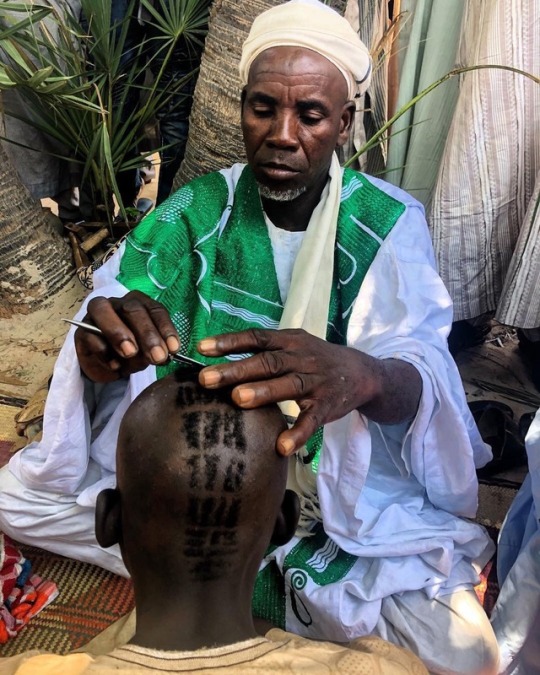
A barber cuts a young boy’s hair. Kebbi, Nigeria. ©Aisha Augie-Kuta
__
“The Kabi young people had some pretty funky haircuts in the past. Within Argungu Emirate, each hair style indicated what family or tribe a child was from and if he was of royal birth. It was a thing of pride to become a royal barber. It came with its own perks and the barbers would show of their skills during the now world renowned Argungu International Fishing Festival as part of the cultural display.”
214 notes
·
View notes
Text
The Beauty of Nigeria

Nigeria is a country blessed with so much resources, diverse beliefs and rich cultures. This rich cultural heritage comes with various colorful celebrations at their festivals.
There are so much festivals to attend at various times of the year, we have the largest street party in Africa called the Calabar carnival, we also have the worship of the goddess Oshun in the Sacred Forest of Osun, the showcasing of the stunning white Eyo masquerades in Lagos, the honoring of the god of Thunder and Lightning at the Sango festival, the Port Harcourt carnival called the Carniriv, the Ofala festival in Anambra where we have the Obi and his chiefs adorned in their red caps and royal regalia alongside their traditional staffs paint, the famous Argungu Fishing festival in the North, where the largest fishes in the world are being caught and lots more.
Why don’t you make that decision to relieve yourself from the stress of life, and take that adventurous journey to Nigeria now. Visit timbu.com/Nigeria to begin that journey.
1 note
·
View note
Photo

Argungu fishing festival on the Sokoto river, Nigeria, 1977 [1280×859] Check this blog!
10 notes
·
View notes
Photo

Argungu fishing festival on the Sokoto river, Nigeria, 1977 via... https://ift.tt/2tLjaiB
1 note
·
View note
Text
Toyin Afolayan


Toyin Afolayan is a Nigerian veteran actress and movie producer. She shot into limelight after starring as Madam Adisa in a 1995 film titled Deadly Affair. Background information Full Name: Oluwatoyin Afolayan Born: 24 September, 1959 Birth place: kwara state, Nigeria Nationality: Nigerian Also known as: Lola Idije Famous as: Actress Years active: 1995 - present Notable work: Deadly Affair Religion: Christian

Biographical history Toyin Afolayan was born in Agbamu, Kwara State on the 24th of September 1959. She is popularly called Lola Adije. She is the aunt of the award winning filmmaker, Kunle Afolayan. Lola Idije is well known for her action roles in Yoruba movies. Also Read About: Argungu Fishing Festival

Acting career Toyin Afolayan was introduced into acting by Kunle’s father, Adeyemi Afolayan (Ade Love) The movie that brought her into limelight was a 1995 movie titled, ‘Deadly Affair.’ In this movie, she played the role of Mama Adisa. Toyin has been in the movie industry for close to 3 decades She also starred in as Kunle’s mother in the movie “Irapada” whuch was produced by her nephew, Kunle Afolayan. Lola Idije has also starred in other movies such as; Lady Terror, Papa and Mammy, Igba Eda.

Family and personal life Toyin Afolayan has three daughter. her first daughter is married with children while her second daughter got married on June 16, 2016. She lost her husband and only son many years ago.

Film by Toyin Afolayan
Deadly Affair Lady Terror Pappy and Mammy Igba Eda and Irapada Reference: https://en.m.wikipedia.org/wiki/Toyin_Afolayan Read the full article
0 notes
Text
IT BLEW UP IN THEIR FACES By Femi Adesina

President Muhammadu Buhari was in Argungu, Kebbi State, on Thursday last week to attend the fishing and cultural festival, which that town is famous for. Prior to this year’s event, the festival had not held for 11 years, due to the insecurity that had suffused a large part of the Northern states. But a ray of hope is being seen on the security horizon. Peace is gradually returning, and the Kebbi…
View On WordPress
0 notes
Text
Argungu Fishing Festival: Man With Biggest Fish Gets N10m, Two Cars, Hajj Seats

Argungu Fishing Festival: Man With Biggest Fish Gets N10m, Two Cars, Hajj Seats
Argungu Fishing Festival: Man With Biggest Fish Gets N10m, Two Cars, Hajj Seats
Abubakar Ya’u from Augie Local Government Area of Kebbi on Saturday got N10 million, two new cars and two Hajj seats for catching the biggest fish weighing 78 kilogramme at the 2020 Argungu fishing festival.
The News Agency of…
View On WordPress
0 notes
Text
The Man who purportedly came to attack the President was an overzealous admirer and not an attacker – Presidency
The Presidency has dismissed circulating information that the man who purportedly charged at President Muhammadu Buhari in Kebbi came to attack him, describing the information as false.

The President was in Kebbi State on Thursday to declare open the Argungu Fishing and Cultural Festival. As the President was going round the arena to inspect rice pyramids on display and take…
View On WordPress
0 notes